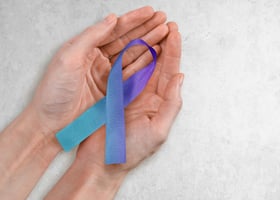Brief, Telehealth-Delivered CBT Can Lower Risk of Suicidality Among High-Risk Adults

Brief cognitive behavioral therapy (BCBT) delivered via telehealth can effectively reduce suicide attempts and suicidal thoughts among high-risk adults, according to findings from a randomized clinical trial issued today in JAMA Network Open.
“BCBT directly targets suicidal behavior by teaching patients to effectively regulate their emotions and cognitively reappraise when presented with stressors,” wrote Justin C. Baker, Ph.D., assistant professor of psychiatry and behavioral health and clinical director of the Suicide and Trauma Reduction Initiative for Veterans at Ohio State University, and colleagues. “However, no studies have investigated the safety and effectiveness of BCBT delivered via telehealth.”
The researchers recruited 96 adults from an outpatient clinic between April 2021 and September 2023, all of whom scored a 5 or higher on the Scale for Suicide Ideation and/or had a suicide attempt within the past month. They were randomly assigned to receive either BCBT or present-centered therapy via telehealth for 12 weeks. The latter focused on identifying adaptive responses to stressors. All participants attended one in-person intake session to meet their therapist, discuss guidelines, and complete a diagnostic interview. Participants completed follow-up assessments at three, six, nine, and 12 months.
Prior to beginning telehealth treatment, clinicians looked up the address of patients’ closest emergency room and helped patients complete either a safety plan or crisis response plan, Baker told Psychiatric News. Clinicians also obtained the name of a nearby emergency contact who could check in on the patient if needed. At the outset of each telehealth visit, clinicians obtained the address of the patients’ current location in case they needed to summon help.
After 12 months, participants who received BCBT reported significantly fewer suicide attempts on average than participants randomized to patient-centered therapy (0.70 vs 1.40 per participant). After adjusting for differences between groups and patient dropout, this resulted in a 41% reduced risk for suicide attempts among adults receiving BCBT. Reductions in suicidal ideation occurred in both treatments, with no significant differences between groups.
The researchers noted that while additional research is needed to distinguish the therapeutic targets associated with improvements in suicidal behaviors vs. ideation, one implication of their findings is that suicidal ideation levels may have limited clinical utility as an indicator of treatment response and risk for suicidal behavior.
“We’ve known that telehealth treatment is effective for some time. What we’ve shown with this trial is that it can also be safe and effective for individuals at high risk of suicide, who have typically been excluded from this type of care,” Baker said.
One issue is the lack of mental health clinicians with the training to provide this specialized form of BCBT. “A lot of therapists just do what they know best. So, these evidence-based psychotherapies are found only in academic centers,” said Baker, who is currently in year one of a four-year grant to develop an online training platform for BCBT that will allow any licensed mental health clinician with internet access to log in and learn to provide this treatment.
For related information, see the Psychiatric News article “To Lower Suicide Risk, Treat Troubled Sleep.”
(Image: Getty Images/iStock/Renata Angerami)
Don't miss out! To learn about newly posted articles in Psychiatric News, please sign up here.





